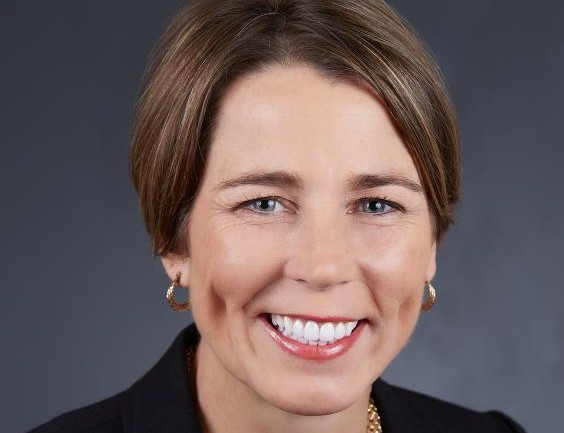latest
Governor Healey adds $734 million to expanding spending agenda

By Sam Drysdale
BOSTON – Gov. Maura Healey has now proposed over $56.5 billion in state spending since taking office, adding a $734 million supplemental budget request to her agenda on Friday.
The new bill seeks to extend the popular state-funded universal free school meals program through next school year, assist school districts with expensive special education programs, recruit and retain more MBTA employees, and fund temporary staffing to respond to health crises in the face of waning COVID-19 emergency dollars.
The largest spending item in the bill is $200 million toward a “Critical Health and Human Services and Workforce Reserve” to continue pandemic response and mitigation efforts through fiscal 2023 and into early fiscal 2024, as federal funds for the crisis come to an end.
The reserve would help temporarily staff nursing homes, group care settings, state hospitals and soldiers’ homes, which remain understaffed three years into the pandemic. A survey earlier this month found half of Massachusetts doctors have already or intend to soon cut back their clinical hours, and the deadly COVID outbreak at Holyoke Soldiers’ Home, partially due to years of understaffing, remains on the minds of Massachusetts residents and lawmakers.
The governor also proposed $10 million to create a new career ladder for licensed practical nurses to “support nursing facilities and home- and community-based services providers in their efforts to retain direct care staff and upskill them to LPNs. The program would fund no-interest loans and grants to support the cost of attending an LPN certification program, as well as living expenses while attending.”
“The bill’s workforce funding is necessary to ensure there are enough health professionals, including licensed practical nurses (LPNs) and certified nursing assistants (CNAs), to meet the needs of vulnerable residents under state care while we transition beyond the COVID-19 public health emergency,” a release from the governor’s office says.
Healey announced earlier this week that the last vestiges of the COVID-19 emergency declaration will end on May 11. Of over 50 public health orders issued by the state’s Department of Public Health since March 2020, six remain in effect today, and will be lifted in May — though Healey plans to enshrine three of the measures that have to deal with health care workforce and staffing in an forthcoming bill.
The future bill would continue staffing flexibilities for out-of-hospital dialysis centers for another six months, aiming to give centers time to return to pre-COVID workforce levels, and authorize some non-Medication Administration Program (MAP) certified staff to continue administering prepackaged medications in community settings for six more months, according to Healey’s office. It would also permanently allow advanced life support-level ambulances to be staffed with a first responder driver and a single EMT provider rather than two certified EMTs.
The end of the federally-declared COVID-19 public health emergency comes with new challenges, as Massachusetts is readying to transition hundreds of thousands of people off the state-run health insurance program over the next year.
Healey’s supplemental budget would give $3.5 million to support the so-called “redetermination” process at MassHealth, to help transition the estimated 400,000 Bay Staters who will be booted off public insurance to new forms of coverage. The shifting of so many Bay Staters off of MassHealth into other subsidized insurance or private insurance tied to employment will free up $1.9 billion in fiscal year 2024 for state spending, based on Healey’s budget.
The supplemental budget also directs $60 million to support caseworkers and staff at the Department of Transitional Assistance, at a time when other pandemic-era benefits are also coming to an end, such as enhanced Supplemental Nutrition Assistance Program (SNAP) payments.
The Legislature is working through another Healey “supp” that allocates $130 million to provide SNAP recipients with 40 percent of their previously enhanced allotment for another three months, after the federal enhanced payments ended this month.
The $282 million bill Healey filed in January also includes $65 million to extend another pandemic-era program through the end of the school year — universal free school meals. The $65 million, if the Legislature passes the bill, will be added on top of the $110 million the state dedicated to school meals in the fiscal year 2023 budget.
The free school meals program was funded by the federal government in the early days of the pandemic, but they dropped the tab last year. Massachusetts is one of the few states that has continued the program with state dollars.
The House and Senate have both come up with their own versions of Healey’s first supp that match the governor’s proposal for school meals through June and expanded SNAP benefits, but have not yet formed a conference committee to come up with a compromise to send back to the governor’s desk. There’s tension brewing over whether they will agree on the provisions before Bay Staters begin to feel the effects of the discontinued benefits next month.
Now with the budget she filed on Friday, Healey is pitching another $171 million toward free school meals to extend the program through next school year as well, until June 2024. The bill also directs the Executive Office of Education to report by “early next year” on ways to extend the program even further.
Anti-hunger advocates and some lawmakers have set their sights on legislation to make the program permanent, and say Massachusetts now has about 56,000 more children eating lunch daily in school than in 2019, before the federal program began. Lawmakers have said free school meals help families save $1,200 a year.
Healey’s budget also includes $75 million for Chapter 766 (special education law) rate relief for school districts planning for a steep escalation in the cost of special education for the 2023-2024 school year.
The state’s Operational Services Division (OSD) set a 14 percent increase for special education out-of-district tuition in fiscal year 2024, and it’s being felt by school districts around the state planning for next year.
Local school officials testified at a hearing on Monday that they were concerned about the effects of the dramatic increase on their operating budgets.
“Because of this OSD increase, [districts] are now talking about, starting in the summer, laying off teachers, which is contradictory to what we’re hearing that we need more teachers in the industry,” Rep. Matthew Muratore said at the hearing.
Already included in Healey’s fiscal year 2024 budget bill is a $15 million increase over the current year appropriation for assistance for districts facing high increases in overall tuition payments, to help alleviate this stress on districts. The supplemental budget the governor filed on Friday would add $75 million to those efforts.
The supplemental budget also proposes $20 million for the MBTA to “better recruit and retain employees to meet its needs and deliver safe, reliable service across the system.”
The T has been marked by service disruptions and safety issues over the past year, most recently when it announced last week that every subway line would run at half speed, and still has not been brought back to full service. System-wide hiring troubles have been largely at the center of disruptions, and Healey pledged in her inaugural address to hire 1,000 additional MBTA employees before the end of her first year in office.
Another investment in the $734 million bill would support an $100 million supplemental transfer to the pension fund, “as agreed to with the House and Senate as part of the consensus revenue process to fully pay down pension liabilities attributable to the 2015 Early Retirement Incentive Program ahead of schedule.”
It would also give $2 million toward the celebration of the 250th anniversary of the American Revolution in Massachusetts and $5 million for local officials to implement new vote by mail and early voting laws passed last year in the VOTES Act.
“We applaud and thank Governor Healey for this important and timely investment in local democracy! Local election officials have the responsibility in the weeks and months ahead to administer municipal elections with new vote by mail and early voting laws. These laws are important expansions to voting rights, and we need to ensure our municipal administrators have the resources they need to be successful. The timing of this funding couldn’t be better,” said the Election Modernization Coalition, which advocated for the funds.
The supplemental budget also includes several outside sections, one that would provide raises for sheriffs. The sheriffs of Barnstable, Bristol, Norfolk, Plymouth and Suffolk counties and of the former counties of Berkshire, Essex, Franklin, Hampden, Hampshire, Middlesex and Worcester shall receive salaries of $191,000, the bill says. The sheriff of Dukes county will receive $150,527, and the sheriff of Nantucket county will receive $120,846.
Other outside sections would “give municipalities more flexibility in how they spend anticipated opioid settlement money — making it easier for cities and towns to quickly use these resource to help address this public health crisis. They will also simplify accounting and fiscal rules regarding revolving funds, insurance proceeds and mitigation agreements,” Healey’s budget filing letter says.






Fed Up
March 19, 2023 at 12:02 pm
Yay lets spend more money we don’t have. ” Massachusetts has the fourth-highest debt in the United States. Massachusetts’s total liabilities are $104.53 billion, and its total assets are $34.214 billion, creating a debt of $68.43 billion. Long-term liabilities are at 305.5% of total assets. Massachusetts’s largest sources of debt are infrastructure and pensions. ”
Where they getting this revenue? ” Massachusetts Lottery ‘very concerned’ about sales as scratch tickets, Keno slump ” https://www.cbsnews.com/boston/news/massachusetts-lottery-sales-scratch-tickets-keno/ Lottery isn’t cutting it neither is the weed revenue
Just like CA
March 19, 2023 at 11:50 pm
Wait until reparations start.